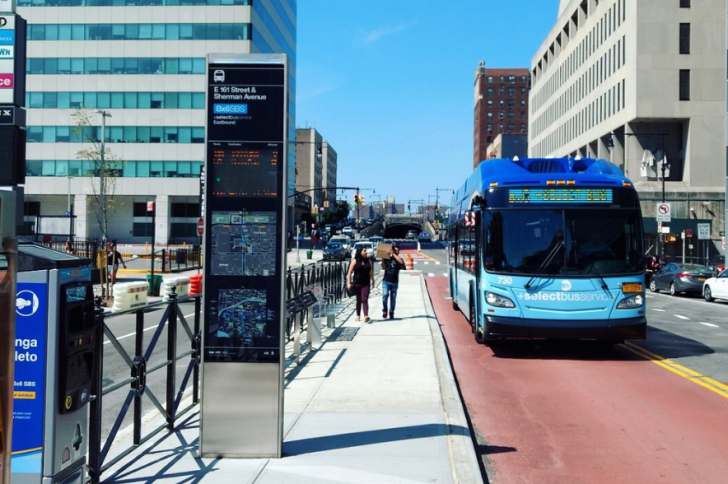Supposedly Cash-Strapped MTA Halts Expansion of Select Bus Service
SBS is a joint venture between the city and the state-run authority, but DOT says the MTA made the decision without consulting the city.

The MTA will create no new Select Bus Service routes for three years, temporarily abandoning a popular and successful program to save a tiny portion of the $562 million the authority says it needs to trim, according to financial plans presented to the MTA board last month [PDF].
The program will be suspended until 2021 once the B82-SBS launches in southern Brooklyn this fall, the documents show. Temporary SBS routes already planned for the L-train shutdown will still be instituted as planned next year.
All told, five SBS routes — the agency would not say which ones — will not be created until the program resumes, a spokesperson told the Wall Street Journal, which first reported the story. The agency says the move — which will affect tens of thousands of bus riders — will save $28 million over the next four years. It comes less than a year after the de Blasio administration pledged millions of dollars to create 21 new SBS routes in the city.
Select Bus Service involves tight cooperation between the MTA, a $17-billion-a-year agency that operates the buses, and DOT, which creates routes, dedicated bus lanes and other infrastructure to speed buses on their way. Bus travel times often improve by double-digits. But DOT spokesperson Scott Gastel said MTA did “no consultation whatsoever” with DOT about plans to suspend the SBS program.
In coordination with DOT, the MTA has used the SBS program as its main vehicle for rolling out bus service improvements. But the program is 10 years old, and advocates are clamoring for the city and MTA to bring key elements of the SBS toolkit — such as bus lanes, all-door boarding, and balanced bus stop spacing — to every route in the city.
“If you have all-door boarding and more bus lanes, you sort of SBS-ize the whole system,” said TransitCenter’s Jon Orcutt.
New York City Transit President Andy Byford’s bus action plan aims to do just that. The MTA is spending $15.7 million on the plan through 2022, and hiring 42 staffers to work on the project.
“It’s hard to escape the conclusion that we’ve giveth with one hand through the Subway Action Plan, and we’ve taketh away, to some extent, through these service cuts,” MTA board member Carl Weisbrod, a de Blasio appointee, told fellow board members and senior MTA officials in a letter, the Journal reported.
A redesigned bus map will not go live until 2021, but riders will get some service changes this year, when the MTA increases off-peak service on certain routes. The introduction of the new fare payment system will speed all-door boarding. And the MTA plans to equip 100 buses on the M14 and M15 lines with bus lane enforcement cameras.
Meanwhile, DOT can continue to roll out bus lanes and move forward in its effort to equip more routes with transit signal priority, which speeds up service by holding green lights for buses.
But the failure of the NYPD to crack down on parking in bus lanes continues to be a problem for SBS service.